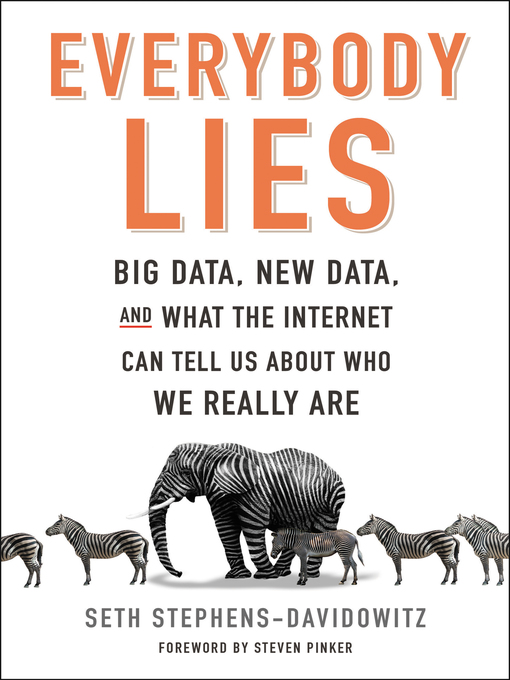
Everybody Lies
Big Data, New Data, and What the Internet Can Tell Us About Who We Really Are
فرمت کتاب
ebook
تاریخ انتشار
2017
نویسنده
Seth Stephens-Davidowitzناشر
Dey Street Booksشابک
9780062390875
کتاب های مرتبط
- اطلاعات
- نقد و بررسی
- دیدگاه کاربران
نقد و بررسی

April 1, 2017
If your pal swears to God that he'll repay a loan, write it off: a tour of the many things that big data can tell us about ourselves.Trained as an economist and a philosopher, Stephens-Davidowitz, a former data scientist at Google, ventures into sociology and psychology with his look at the corpus of search terms run through that site, "a bizarre dataset" that often yields uncomfortable results, revealing hidden reservoirs of racism, sexual insecurity, hypocrisy, and outright dishonesty. For instance, he writes, so-called undecided voters usually aren't undecided at all; if researching political issues using phrases such as "Trump Clinton taxes," one's vote will almost always go to the candidate named first. Pollsters predicted a heavy turnout of African-American voters in favor of Hillary Clinton, but those voters didn't show up. Meanwhile, the data that Stephens-Davidowitz sifts through reveal a strongly racially motivated vote on the part of whites, speaking to "a nasty, scary and widespread rage that was waiting for a candidate to give voice to it," even though those same people would profess publicly to being beyond issues of race and indeed "postracial," in that quaint term of yore. Some of the author's other findings concern social "tells," in the language of gambling, such as the hedge words someone might use in conversation: "Fellas, if a woman...'sorta' likes her drink or 'kinda' feels chilly...you can bet that she is 'sorta' 'kinda' 'probably' not into you." Yet this book has broader implications than one's chances of success at a singles mixer. Stephens-Davidowitz looks, for example, at the statistics surrounding political assassination and what happens to a government afterward, recidivism among prison inmates (the harsher the conditions, the more likely a return to crime), the correlation of education and financial success, the keywords of lying, and other big-picture questions. Statistics wonks will find much of interest in this survey. For the rest of us, this book offers as many reasons to be dispirited about the human condition as the daily headlines.
COPYRIGHT(2017) Kirkus Reviews, ALL RIGHTS RESERVED.

July 1, 2017
"Fake news" may be the current buzz words, but personal truths have never been so tangible thanks to data scientists. Stephens-Davidowitz (former Google data scientist and current New York Times columnist) unpacks this telling data, explaining exactly how people lie every day. Mining data from Google Searches to niche sites such as PornHub, it becomes quickly evident that digital data reveals more human truths than any formally conducted survey. Be warned; some of this information may be disturbing as there is no doctoring the digital accuracy when it comes to queries on sex, race, gender, and politics. These hidden revelations shed light on the potential for even deeper exploration of the human psyche as more academics embrace the use of Big Data for research. After reading this pivotal work, personal Google searches will never be the same. As for our author, he is banking that human curiosity outweighs self-censor for he has more big lies to explore. VERDICT A book for those who are intensely curious about human nature, informational analysis, and amusing anecdotes to the tune of Steven Levitt and Stephen Dubner's Freakanomics.--Angela Forret, Clive P.L., IA
Copyright 2017 Library Journal, LLC Used with permission.

























دیدگاه کاربران